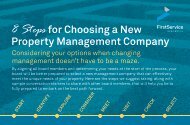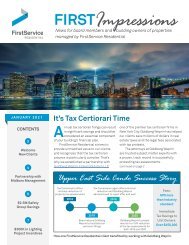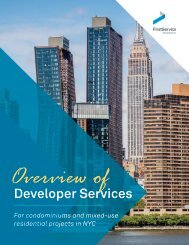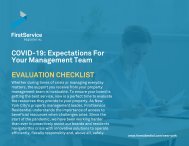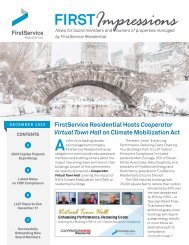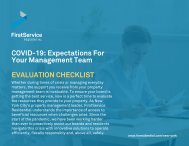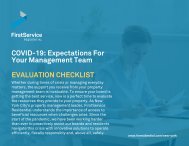8 Steps 2.18.2021 Jeremy spread
Create successful ePaper yourself
Turn your PDF publications into a flip-book with our unique Google optimized e-Paper software.
8 <strong>Steps</strong> for Choosing a New<br />
Property Management Company<br />
Considering your options when changing<br />
management doesn’t have to be a maze.<br />
By aligning all board members and determining your needs at the start of the process, your<br />
board will be better prepared to select a new management company that can effectively<br />
meet the unique needs of your property. Here are the steps we suggest taking, along with<br />
sample conversation starters to share with other board members, that will help you be to<br />
fully prepared to embark on the best path forward.<br />
START<br />
IDENTIFY<br />
EXPLORE<br />
CONSIDER<br />
MEET<br />
VISIT<br />
CHECK<br />
SELECT
Step 1:<br />
Identify Your Needs<br />
If your board is dissatisfied with its current<br />
management company, we suggest speaking<br />
with the company’s senior management and<br />
ownership to give them an opportunity to<br />
correct the deficiencies. If they fail to<br />
take the necessary steps to address<br />
the problems, it may be time for a<br />
change.<br />
Consider how your existing company has<br />
not satisfied the day-to-day and unique<br />
needs and requirements of your building.<br />
Recognizing these shortfalls will help your<br />
board identify the service offerings and solutions<br />
required from your future management company.<br />
Start the Conversation:<br />
“Our board is essentially handling our day- to-day property<br />
operations because our current manager lacks the skill set,<br />
support and resources.”<br />
“Since COVID-19, our service has<br />
dropped off considerably and the lack of<br />
notifications and updates is concerning.”<br />
“The board appreciates being involved in<br />
making decisions, but it feels like we’re<br />
missing out on resources and financial<br />
savings.”<br />
“Over the last year our property manager<br />
has become much less proactive in<br />
communicating with our board and<br />
shareholders and our management<br />
company hasn’t addressed our concerns<br />
after we contacted senior management and<br />
ownership. Should we take the next step<br />
and start searching for a new management<br />
company?”<br />
©2021 FirstService Residential. All Rights Reserved.
TOP THREE REASONS BOARDS<br />
CONSIDER NEW MANAGEMENT<br />
The first step is to<br />
understand how your current<br />
management company fails to<br />
serve the needs of your board and<br />
residents. Aligning with the full<br />
board on the issues is critical for a<br />
smooth decision-making process.<br />
Not all board members may agree,<br />
so communicate your opinions<br />
clearly and share what you<br />
believe the ultimate benefits<br />
to your property will be.<br />
1. Quality Management – An unresponsive property<br />
management company, failure to address task lists,<br />
compliance violations and fines, inaccurate financial<br />
reporting, inadequate staff training, or lack of<br />
communication and technology resources are<br />
just a few reasons to consider a change.<br />
2. Cost Savings and Increased Revenue– Is<br />
your current company helping you find<br />
ways to increase revenue (additional<br />
ancillary fees, convert unused spaces)<br />
or reduce costs? Consider your reserve<br />
investments, borrowing costs, supplies and<br />
service providers, insurance, real estate taxes,<br />
contracts and utility rates – if you are spending<br />
too much you may want to look elsewhere.<br />
3. Capital Projects – Your last capital project<br />
was poorly executed, improperly budgeted and/<br />
or creatively financed, and now there is the threat of<br />
litigation because inadequately-insured vendors were<br />
used. With several additional projects slated, you want to<br />
make the change well before they get underway.<br />
©2021 FirstService Residential. All Rights Reserved.
Step 2:<br />
Choose to Explore<br />
Your board is responsible for<br />
making critical decisions,<br />
creating policies, and laying a<br />
cultural foundation for your<br />
owners and their families.<br />
If your board has found<br />
that your management<br />
company is not equipped<br />
to render adequate<br />
guidance and support based<br />
on industry experience, it<br />
may be time to begin to explore<br />
alternative companies that can<br />
provide the level of service and<br />
solutions required for your property.<br />
Start the Conversation:<br />
“It feels like we can’t rely on our<br />
management company to follow through<br />
on our property’s day-to-day tasks, and<br />
we’re getting nervous about how they will<br />
handle our upcoming capital projects.”<br />
“Our friends live in a FirstService<br />
managed property and they receive<br />
frequent updates about the industry and<br />
things that affect us.”<br />
“Does our management company have<br />
the resources to enhance our property<br />
values, reduce operating costs and<br />
improve the lifestyles of our residents?”<br />
A lack of direction and support from<br />
your management company can<br />
frustrate your decision making or<br />
facilitate costly mistakes given the lack<br />
of immediately available resources. In<br />
turn, your residents may lose confidence<br />
in the board’s ability to protect their<br />
interests.<br />
©2021 FirstService Residential. All Rights Reserved.
Step 3:<br />
Consider Your Options<br />
Now that you’ve identified your needs, and the<br />
board is aligned that a change may be needed, the<br />
research process can begin. Narrow down your<br />
findings to a list of three to five companies<br />
that you feel can offer the right mix of<br />
resources and solutions for your property.<br />
Remember, a “one size fits all<br />
approach” to property management is<br />
typically ineffective. Speak with industry<br />
professionals, such as your property’s<br />
attorney and accountant, or board members of<br />
neighboring buildings to get recommendations.<br />
Focus your research on what best practices and<br />
resources will help solve your property’s issues or<br />
take your building operations – and reputation – from<br />
good to great.<br />
©2021 FirstService Residential. All Rights Reserved.
Step 4:<br />
Arrange a Meeting<br />
While your first impulse may be to obtain a price<br />
comparison or initiate a formal RFP process, this<br />
approach will only compare companies on an estimated<br />
base management fee and organizational level that will not<br />
provide any personalized solutions to your property’s specific<br />
challenges.<br />
Once you’ve narrowed down your list of potential management<br />
companies, schedule a virtual discovery session to get an<br />
overview of each company’s experience managing properties<br />
similar in size and scope to yours. An ideal discussion will<br />
illustrate how their team can solve your unique challenges<br />
and meet or exceed your expectations. Be wary if the<br />
managing agent you’re speaking with is only able to<br />
provide an overview of their company. You want a<br />
company that can offer clear and definitive<br />
solutions to your specific issues that will<br />
benefit your board and property.<br />
©2021 FirstService Residential. All Rights Reserved.
Following the discovery meeting,<br />
if the board feels the management<br />
company is a contender, the board<br />
should consider sending the<br />
company the most recent<br />
audited financial statement.<br />
It’s part of the due<br />
diligence process and<br />
will give the company<br />
an opportunity to<br />
understand your<br />
property’s finances<br />
which is an important<br />
supplement to the physical<br />
review conducted during the<br />
property walk-through.<br />
Your building is unique and there<br />
is no such thing as a one size fits<br />
all approach.<br />
Getting Organized Before Your Meeting:<br />
f<br />
f<br />
Get aligned with your board on<br />
what you really need from your<br />
management company.<br />
Take time during a board meeting<br />
to discuss what questions you<br />
need to ask and narrow down these<br />
questions to your top must-haves.<br />
The questions should be tied back<br />
to the problems with your current<br />
management company that you’ve<br />
identified.<br />
Use our Property Management Checklist to<br />
help you evaluate the resources, expertise<br />
and services offered by each management<br />
company under consideration.<br />
©2021 FirstService Residential. All Rights Reserved.
Step 5:<br />
Schedule a Building<br />
Walk-through<br />
Start the Conversation:<br />
“Let’s invite them to visit our property so that we can meet<br />
the team in person, see if we are a good fit for each other, and<br />
discuss some potential solutions.”<br />
Win-Win<br />
The property walk-through is a crucial step in communicating<br />
the unique needs of your building. The conversation may<br />
even uncover new solutions to your challenges or reveal<br />
opportunities for improvement not previously considered.<br />
Whether you go with the company or not, use this visit<br />
to your advantage.<br />
©2021 FirstService Residential. All Rights Reserved.
Step 6:<br />
Review the Proposals<br />
The proposals you receive should, at a minimum, answer<br />
each of these questions:<br />
f<br />
f<br />
f<br />
f<br />
f<br />
How long have they been managing properties like<br />
ours?<br />
Can we assess their financial stability?<br />
Do they employ property managers who are the<br />
right fit for our property?<br />
What types of training and educational programs<br />
are provided for property managers, board<br />
members, and building staff?<br />
What types of communication technologies are<br />
available to the property managers, board and<br />
residents?<br />
©2021 FirstService Residential. All Rights Reserved.
f<br />
f<br />
f<br />
f<br />
f<br />
f<br />
f<br />
When it comes to local law<br />
compliance, does the company have<br />
in-house subject matter experts to<br />
support its managers?<br />
Does the company offer support in<br />
legal matters?<br />
What unique solutions and resources<br />
do they offer that will reduce our<br />
operating costs?<br />
Does the company provide<br />
24/7 customer service for both<br />
emergencies and general inquiries?<br />
What is their transition process<br />
when bringing on a new property?<br />
Can they provide references?<br />
Does company leadership hold<br />
prominent positions in industry<br />
leading organizations?<br />
©2021 FirstService Residential. All Rights Reserved.
Step 7:<br />
Schedule a Formal<br />
Presentation<br />
Start the Conversation:<br />
Barring any pandemic-related restrictions,<br />
it’s also important to visit the management<br />
company’s offices. Getting a first-hand look<br />
at how they manage their business will provide<br />
some insight into how they will manage your<br />
property.<br />
“Do they have in-house subject matter<br />
experts and partnerships with service<br />
providers that will really add value to<br />
our property?”<br />
Be wary of a company that offers only<br />
generalizations about their approach<br />
to managing your property. A quality<br />
management company will present<br />
specific solutions to address your<br />
unique challenges, and resources<br />
that match your expectations.<br />
Ask Yourself<br />
“Did the presentation<br />
respond directly to the needs<br />
and vision we communicated?”<br />
“Do they have in-house subject<br />
matter experts and proven solutions<br />
that will really add value to our<br />
property?”<br />
“Are we confident they have the internal<br />
support and resources to meet our property’s<br />
high standards for responsiveness and<br />
service?”<br />
©2021 FirstService Residential. All Rights Reserved.
Step 8:<br />
Consider Your Options<br />
Start the Conversation:<br />
“Is everyone on the board on the same page with this<br />
decision? Let’s all agree to talk through any pros and cons<br />
before we sign.”<br />
Finish Line:<br />
If your board follows these steps closely, the final decisionmaking<br />
process will be the easiest step. Alignment with your<br />
board, research, a building walk-through, and meeting the<br />
team are key to paving the way to a confident choice.<br />
Are you ready to consider new management for your<br />
property? Let’s talk!<br />
Click here to request more information from FirstService<br />
Residential.<br />
©2021 FirstService Residential. All Rights Reserved.
Let’s talk.<br />
Call me today to set up a time:<br />
JEREMY COHEN<br />
Business Development Director<br />
Manhattan Office<br />
212.324.9945<br />
jeremy.cohen@fsresidential.com<br />
Whether during times of crisis or managing everyday<br />
matters, the support you receive from your property<br />
management team is invaluable. To ensure your<br />
board is getting the best service, use this checklist<br />
to evaluate how your management company is<br />
helping your board and property navigate your<br />
unique issues.<br />
Making a Difference. Every Day.<br />
©2021 FirstService Residential. All Rights Reserved.







